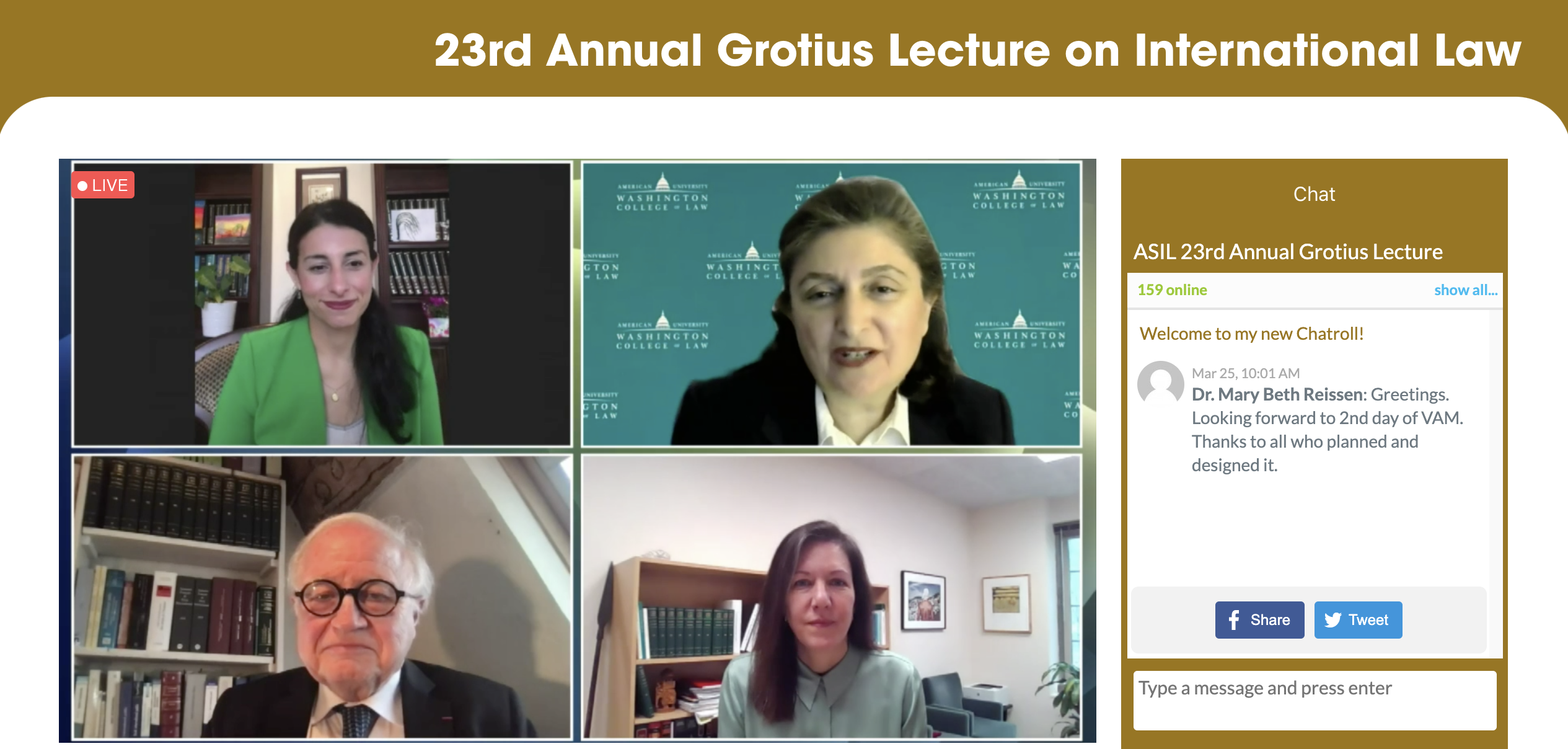
“Never let a good crisis go to waste! Can international law seize the advantage?”
23rd Annual Grotius Lecture
On March 25, 2021, Professor Yves Daudet delivered the 23rd Annual Grotius Lecture at the ASIL Annual Meeting followed by Distinguished Discussant Professor Hannah Buxbaum. The Grotius Lecture is sponsored by American University Washington College of Law. Professor Daudet is Emeritus Professor of Public International Law at University Paris I Panthéon-Sorbonne, President of the Curatorium of The Hague Academy of International Law, and Ad Hoc Judge at the International Court of Justice. Professor Hannah Buxbaum is Vice President for International Affairs at Indiana University, holds the John E. Schiller Chair in Legal Ethics, and Professor of Law at Indiana University Maurer School of Law.
ASIL President Catherine Amirfar provided introductory remarks and Professor Padideh Ala’i, Director of International and Comparative Legal Studies and Professor of Law at American University Washington College of Law, presented Professors Daudet and Buxbaum.
Professor Daudet delivered the Grotius Lecture under the theme of the words famously attributed by some to Sir Winston Churchill: “Never let a good crisis go to waste!” and asked himself: “Can international law seize the advantage?” He noted that crises today are inherently international and therefore inevitably affect the application of international law.
Daudet’s review of the opportunities for international law in times of crisis led him to analyze two essential components of the international legal order: sovereignty and multilateralism.
Daudet observes that successive crises have put into question traditional notions of sovereignty and led to the evolution of new forms of sovereignty. In international environmental law, the no-harm principle has nuanced the traditionally broad powers of states to use their territory as they please, requiring that no harm to others results from the exercise of those powers. The very notion of “international border” evolved over time as a response to so many factors, among them international migration. For example, the rapid evolution of international criminal law in the early 1990s as a bar to committing atrocities on its own territory was a response to the civil wars in the former Yugoslavia and Rwanda. Both examples demonstrate that crises have often triggered the transformation and evolution of international law, and with it the notion of sovereignty.
Daudet also observes that crises may create opportunities for multilateral approaches to international cooperation. The United States’ change in attitude since the start of the Biden Administration illustrates the strength of multilateralism for tackling the challenges of our times. On President Biden’s first day in office, he re-signed the Paris Climate Agreement and called for a Climate Summit on April 23 in Washington, D.C.
Multilateralism is also considered pivotal for the defense of democracy amidst a broad crisis of the constitutional order in many states. According to Daudet, to counterbalance populist movements across the world requires holding firm to the values of the liberal democracies in multilateral fora. He pointed to the importance of international human rights as a potential multilateral framework for the safeguarding of our democratic order. However, he also noticed the weakness of that system and called for more pedagogy and discussion about democratic values—again leading to a multilateral approach. The health crisis, in addition, demonstrates the need for solidarity as a way to catalyze the response to some crises in a multilateral context.
In her comments, Professor Buxbaum observed that Daudet invokes a new form of multilateralism for the global age. She highlighted the close relationship between multilateralism and solidarity. The COVID crisis has shown with particular strength the functional role of a multilateral and solidary approach to cooperation. Some states are necessarily better equipped to offer significant investments in the development of vaccines, but a genuinely efficient fight against the pandemic is only possible with global solidarity. As states realize the interdependency and collective vulnerability to global crises, they support the move towards multilateral approaches. In stating this, Professor Buxbaum underlined the fundamental axiom of international law according to which any general trend in conduct, such as multilateralism, has to come voluntarily as a result of a choice made by the states.
The conference by Professor Daudet and Professor Buxbaum’s response are powerful expressions of hope and calls for action towards a multilateral world order and a strong response to those who still advocate for nationalistic, isolationist approaches to global crises.
The full lecture is available here.